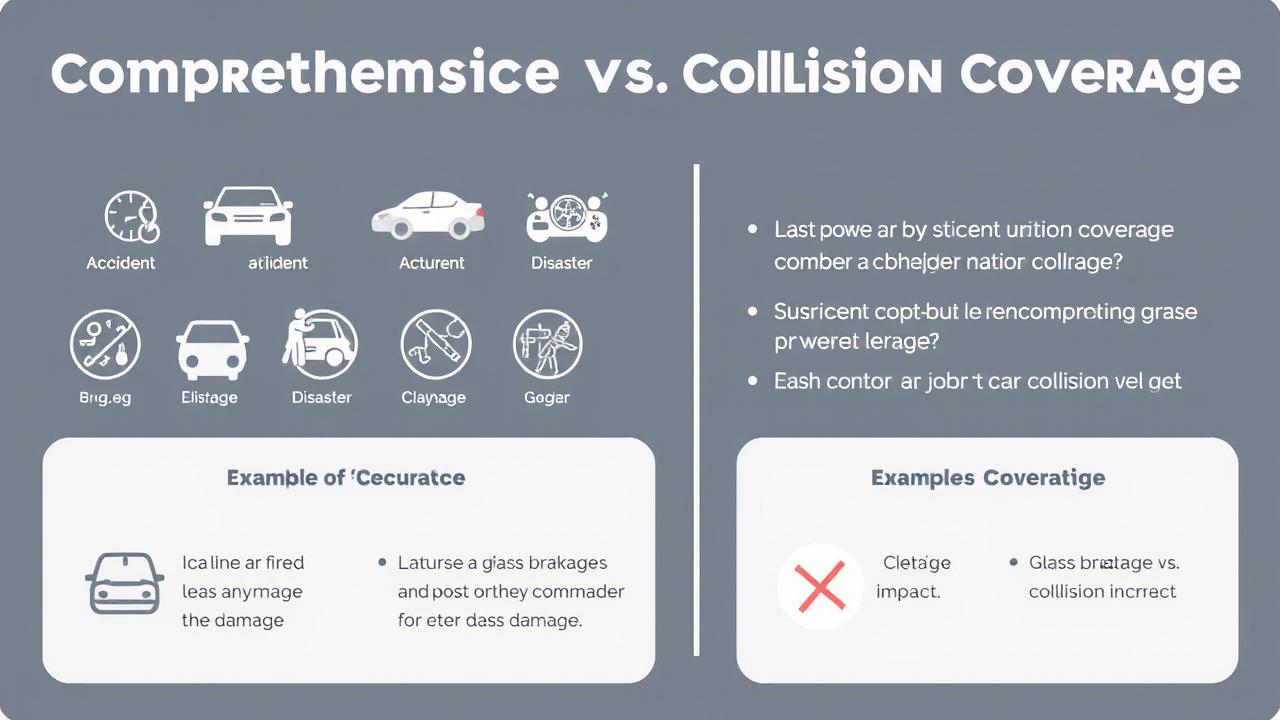Understanding Comprehensive vs. Collision Coverage

Understanding Comprehensive vs. Collision Coverage
When it comes to car insurance, understanding the differences between comprehensive and collision coverage is essential for making the right choice for your needs. These two types of coverage play crucial roles in protecting your vehicle, but they work in different ways. In this article, we will explore both types of coverage to help you better understand their unique functions and decide which one might be right for you.

What is Comprehensive Coverage?
Comprehensive coverage is a type of car insurance that helps protect your vehicle from damage not caused by a collision. It covers a wide range of situations that can result in damage to your car, including:
-
Theft: If your car is stolen, comprehensive coverage will help you replace it.
-
Vandalism: If your car is damaged intentionally, such as having windows broken or scratches on the body.
-
Natural Disasters: Damage caused by weather events like hailstorms, tornadoes, or flooding.
-
Animal Collisions: If your car hits an animal, such as a deer, or is damaged by an animal’s actions.
-
Fire: If your car is damaged or destroyed in a fire, whether accidental or due to a mechanical issue.
Comprehensive coverage offers peace of mind knowing that your vehicle is protected from a wide array of unforeseen incidents. However, it generally comes with a deductible, which is the amount you must pay before your insurance kicks in. It is important to note that comprehensive coverage typically applies when the damage occurs outside of your control and is not the result of a car crash.
What is Collision Coverage?
Collision coverage, on the other hand, specifically covers damage to your vehicle resulting from a collision. This includes:
-
Accidents with other vehicles: If you are involved in a crash with another car, collision coverage helps cover the costs of repairing or replacing your vehicle.
-
Single-vehicle accidents: If you hit a tree, guardrail, or any other object, collision coverage will help cover the damage.
Unlike comprehensive coverage, collision coverage applies in situations where your vehicle is physically impacted. It is especially useful for those who want protection in the event of a crash, regardless of who was at fault.
Key Differences Between Comprehensive and Collision Coverage
-
Cause of Damage: Comprehensive coverage applies to non-collision-related damage (such as weather or theft), while collision coverage applies only to damage resulting from a car accident or crash.
-
Cost: Comprehensive coverage is typically more affordable than collision coverage. The cost of each depends on your car’s value, the deductible, and your insurer’s rates.
-
Purpose: The goal of comprehensive coverage is to protect your car from natural or accidental damage not related to driving, while collision coverage ensures you’re covered in the event of a driving-related incident.
Which One Do You Need?
Whether or not you need comprehensive or collision coverage depends on several factors, such as the value of your car, your driving habits, and the risks you are most concerned about. Here are some considerations:
-
If you drive an older car: If your car is older or has a lower value, you may decide that collision and comprehensive coverage are not worth the cost. In this case, you could choose to drop one or both, depending on your preferences.
-
If you live in an area prone to natural disasters or high theft rates: Comprehensive coverage can be valuable if you live in an area where your vehicle is at higher risk for things like flooding, hail, or theft.
-
If you are involved in daily driving: If you drive frequently, collision coverage is more important for protecting your car from accident-related damage.
Many drivers choose to have both comprehensive and collision coverage, offering a broader level of protection. However, this depends on your personal preferences and insurance needs.
Conclusion
Understanding the differences between comprehensive and collision coverage is key to making an informed decision about your car insurance policy. By evaluating your car’s value, your driving habits, and the potential risks you face, you can select the coverage that best suits your needs. Whether you choose one or both types of coverage, remember that the ultimate goal is to ensure you have the protection necessary to get back on the road quickly and without worry.